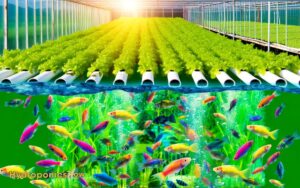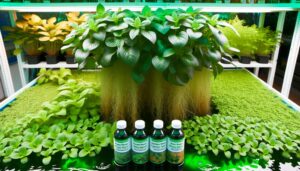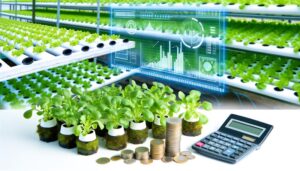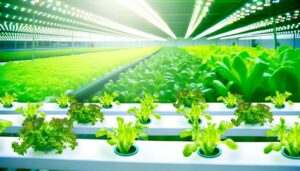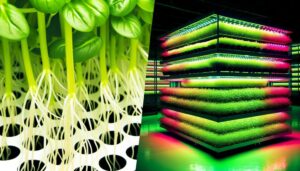Discover the Top 5 Benefits of Urban Farming: Hydroponics as a Powerhouse
Urban farming through Powerhouse Hydroponics offers substantial advantages. You can maximize space as vertical systems grow ten times more crops per square foot.
These setups use up to 90% less water, thanks to closed-loop systems that minimize waste. Plants grow up to 50% faster with optimized nutrient delivery, leading to higher yields per square meter.
Controlled environments reduce pests and diseases, making chemical pesticides almost unnecessary. Year-round production eliminates seasonal limitations, leading to sustainable and efficient urban agriculture.
Discover how these benefits transform urban farming into a powerhouse of productivity and sustainability.
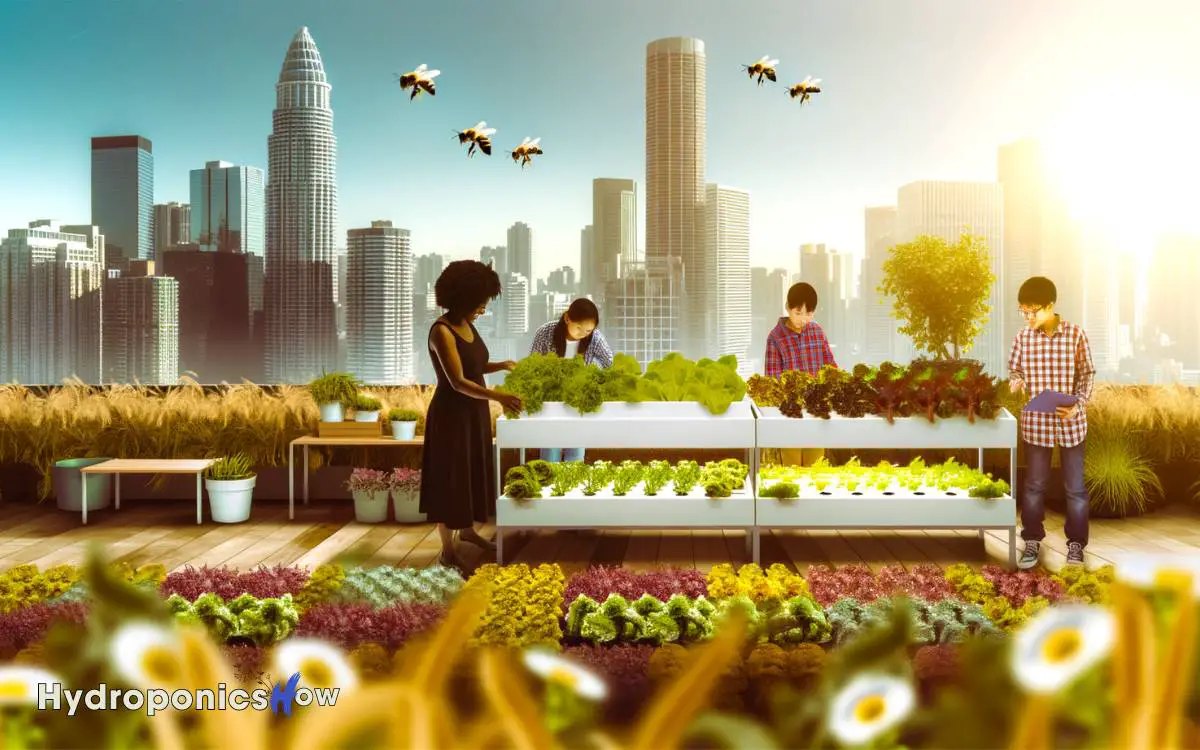
Key Takeaways
Space Efficiency
Urban farming with hydroponics maximizes space efficiency by enabling vertical stacking and dense plant growth. You can utilize vertical farming systems to grow 10 times more crops per square foot compared to traditional soil-based farming.
This method lets you optimize urban spaces, turning rooftops, basements, and even walls into productive agricultural zones.
Data indicates that hydroponic setups can yield up to 240 plants per square meter, notably higher than conventional methods. This approach allows you to reclaim urban environments, making them green and productive.
With precise nutrient delivery systems, plants grow faster and healthier, ensuring you get the most out of your space.
Water Conservation
In addition to maximizing space efficiency, hydroponic systems drastically reduce water usage by recycling and reusing water, consuming up to 90% less water than traditional soil-based farming.
This water conservation has significant benefits for urban farming:
- Efficient Water Use: Hydroponics systems guarantee that water is delivered directly to plant roots, eliminating waste.
- Closed Loop Systems: The water in hydroponics is recirculated, reducing the need for constant fresh water input.
- Reduced Evaporation: By minimizing water exposure to air, hydroponics drastically cuts down evaporation losses.
- Scalability: Hydroponics’ efficient water use makes it viable for large-scale urban farming, supporting sustainable city agriculture.
This method not only conserves water but also contributes to sustainable urban living, aligning with your desire for freedom and resource efficiency.
Faster Growth Rates
By utilizing hydroponic systems, plants can achieve growth rates up to 50% faster compared to traditional soil-based methods. This acceleration is attributed to the direct delivery of essential nutrients dissolved in water.
You can optimize nutrient uptake, ensuring plants receive consistent, balanced nourishment. Additionally, controlled environments allow you to manipulate light, temperature, and humidity, creating ideal growth conditions.
In hydroponics, root systems don’t expend energy searching for nutrients in the soil. Instead, they focus on rapid development, leading to faster vegetative and flowering stages. Data from multiple studies demonstrate that this method notably reduces growth cycles.
For those seeking efficiency and autonomy in their urban farming endeavors, hydroponics offers a powerful solution to maximize plant growth rates effectively.
Higher Crop Yields
Hydroponic systems can greatly enhance crop yields by providing plants with an optimized nutrient solution and controlled growing environment.
You’ll notice significant improvements in productivity due to several factors:
- Nutrient Efficiency: Hydroponics guarantees that plants receive the exact nutrients they need, reducing waste and accelerating growth.
- Space Utilization: Vertical farming techniques maximize space, allowing you to grow more plants per square foot.
- Water Conservation: Hydroponic systems use up to 90% less water than traditional methods, guaranteeing sustainable use of resources.
- Year-Round Production: Controlled environments eliminate seasonal dependencies, allowing for continuous crop cycles.
Pest and Disease Control
One major advantage of hydroponic systems is their ability to greatly reduce the incidence of pests and diseases due to the controlled environment. You can minimize the need for chemical pesticides, leading to healthier produce.
By closely monitoring nutrient solutions and plant health, you can swiftly address issues before they escalate. This precision management allows for a cleaner, safer growing environment.
| Factor | Traditional Farming | Hydroponic Systems |
|---|---|---|
| Pest Incidence | High | Low |
| Disease Outbreaks | Frequent | Rare |
| Pesticide Usage | Extensive | Minimal |
With fewer pests and diseases, you’ll enjoy higher yields and lower crop losses. Hydroponic systems empower you to cultivate crops with unmatched efficiency and cleanliness, giving you the freedom to innovate and optimize your urban farming endeavors. Additionally, the controlled environment minimizes the need for pesticides, promoting healthier and more sustainable food production. The advantages of hydroponic farming also include faster plant growth and the ability to grow crops year-round, regardless of seasonal changes. This innovative approach not only conserves water but also maximizes space, making it ideal for urban agriculture.
Conclusion
Incorporating hydroponics into urban farming offers significant benefits. You can save up to 90% of the water used in traditional farming, making it a highly efficient method.
You’ll also enjoy faster growth rates and higher crop yields, transforming limited city spaces into productive green hubs. Additionally, hydroponics minimizes pest and disease risks, ensuring healthier crops.
By leveraging these advantages, you’re not just farming smarter; you’re contributing to a more sustainable urban environment.

